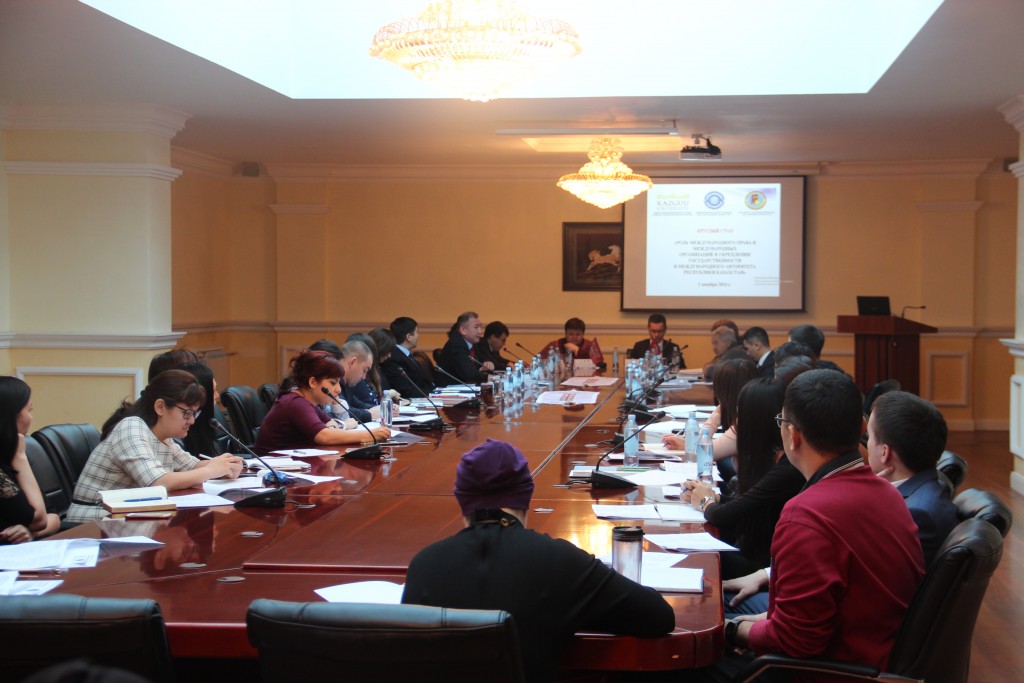ASTANA – Kazakh professors and legal researchers talked about challenges and opportunities for Kazakhstan’s participation in international organisations at a Dec. 3 roundtable devoted to the 25th anniversary of Kazakhstan’s Independence and election of Kazakhstan for a non-permanent seat in the United Nations Security Council.
“Membership in the UN Security Council is both honourable and very difficult. The Security Council is the principal organ of the UN, which has the primary responsibility for the maintenance of international peace and security. The Council is composed of 15 [five permanent and ten non-permanent members] out of 193 UN member states and being included in this elite circle is a great honour. UN member states have expressed great confidence in Kazakhstan,” Assistant Professor in International Law at KIMEP University Sergey Sayapin said to The Astana Times.
“Kazakhstan has become the first Central Asian country elected a non-permanent member of the Security Council. In this sense, the eyes of the world are fixed upon Kazakhstan. On the other hand, it is a great responsibility. Over the next two years, Kazakhstan will have to respond adequately to global challenges on a daily basis. The country will have to deal with terrorism challenges, questions related to the misuse of military force, drug trafficking, human trafficking, cross-border crime and corruption on an international scale. To cope with all these challenges, Kazakhstan will have to strengthen its legal framework and improve the efficiency of law enforcement agencies to interact with other states and prevent the criminal manifestations. I am sure, having worked in the Security Council over two years, Kazakhstan will become a more experienced state and Kazakh diplomats will become more experienced and effective as well,” he added.
The event, organised by the Ministry of Foreign Affairs and International Law Centre of Kazakh Humanitarian Law University, brought together representatives of government agencies, international organisations and universities to discuss the role of international law in the strengthening of statehood and international authority of Kazakhstan.
International law plays an essential role in international society, regulating relations and helping to avoid disputes between states. International law exercises a constitutive function, regulating various aspects of the emergence of a new state. In addition, international law contributes in strengthening the capacity of states in their functioning as a cohesive and stable political community. Relying on international rules and institutions, Kazakhstan managed to achieve a good international reputation.
Over the past decade, Kazakhstan has been demonstrating its aspiration for international security and peace. In 2010, Kazakhstan became the first former Soviet state to chair the Organisation for Security and Cooperation in Europe (OSCE). It is also chaired the Organisation of Islamic Cooperation (OIC) in 2011-2012. This year, Kazakhstan took over the chairmanship of the Shanghai Cooperation Organisation (SCO). In turn, international organisations have contributed significantly to the strengthening of Kazakhstan’s statehood. Respected international bodies supported most legal and political reforms implemented in Kazakhstan. Moreover, Kazakhstan acted as a mediator in the reactivation of the talks on the Iranian nuclear issue.
The event participants focused attention on Kazakhstan’s role in the international system, international legal order, development trends of international law in Kazakhstan and contribution of international organisations in the development of international law.
Addressing participants of the roundtable, Ambassador at Large of Kazakh Ministry of Foreign Affairs Mainura Murzamadiyeva focused on the cooperation with the International Law Centre and outlined key projects initiated by the centre’s leadership.
“We are planning to analyse the international treaty framework of Kazakhstan. Over the years of independence, Kazakhstan signed several thousand different agreements affecting various areas: cooperation in political and economic spheres, legal security, science, education, tourism and so on. Therefore, we are planning to provide the University researchers with access to the agreement database,” she noted.
According to Murzamadiyeva, this great scientific work is supposed to result in the expansion of the scope of treaties’ application.
Roundtable speakers made several suggestions concerning the development of international law in Kazakhstan. Particularly, participants talked about the need to introduce training or retraining of judges in the important facets of international law such as the international legal personality, protection of human rights, international humanitarian and criminal laws, corruption crimes, international economic law and other areas.
In addition, it was suggested to consider the idea of developing a patricide concept aimed at preserving statehood and stability, which is believed to be largely supported by the international community amid current international tensions.


